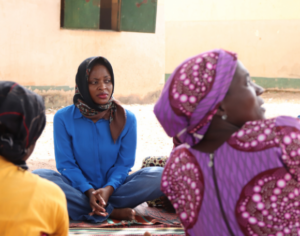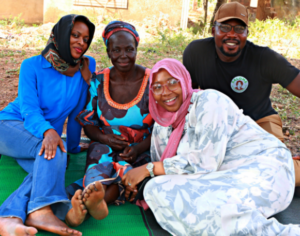
Kaltumi visiting the Kasuwan Magani Community
I came from a minority tribe (Ebira) located in north-central Nigeria. Growing up, I was surrounded by societal discrimination against women. I was constantly pressured and harassed by people not known to me on social media. People would ask me to go get married and stop wasting my time networking with my male counterparts at my place of work. I was still in my early 20s then. This is a common and normal scenario in the lives of many women, with society marriage shaming them to make them feel less of themselves, to think that they’re not worthy when unmarried.
I still remember how the village king in the community where I served wanted to marry me as his third wife. He said,“this work that you’re doing is not meant for women so just forget about this project and get married.”
Having to deal with all these obstacles is not the same for some women. In some cases, women just give up their dreams because the community doesn’t support or encourage them to thrive. My mother was a victim of this nightmare. She was denied her right to education, while her younger brothers all went to school. Her father repeatedly told her that education was not for girls. Instead, she was told to look after her younger siblings and carry out chores in preparation for keeping a matrimonial home.
Growing up around these societal norms made me realise that I had a responsibility to change these narratives. I owed this to my mother and to other women facing these same stereotypes. I had the desire to empower myself and my community, by raising a generation of highly educated, independent, and fearless women and girls.
Support women peacebuilders like Kaltumi with a gift today.
Fast forward to 2017, when I was serving as a youth corps member after graduating from university. One day, I encountered several groups of women and children walking on the street with a cloud of sadness hanging on their faces. I found out that they were survivors of the Boko Haram conflict, having fled to seek refuge. It was evident that their situations were dire, and they had faced a myriad of brutal events. Many had lost their husbands, wives, and loved ones and, worse still, had no source of income or access to basic amenities. I knew that I had to do something to help these women.
But, I knew that the relief was not enough to mitigate the problem. I also used the media to draw attention to the situation. As a result, I managed to get the interest of the Governor of the State, through the State Emergency Management Agency. They made donations of food and other relief which reached over 500 women and children.
The distribution of all these relief items triggered a ton of emotions – and I knew that my life had a newfound meaning. This pivotal moment in my work meant that I could do more for these survivors and the members of my community.
Kaltumi’s early days providing relief grew into the formation of LEGASI. Her organisation has provided trauma counselling, supported internally displaced communities (IDP), and created women-led initiatives.
One specific initiative that Kaltumi would like to highlight is her work with the Kasuwan Magani community in Northern Nigeria. An outbreak of conflict in 2018 caused segregation and exclusion there. LEGASI has worked with the women affected by this crisis, providing trauma counseling and healing the divides.

Kaltumi, Catherine (from the Kasuwan Magani Community), Hadiza (photojournalist) and Patrick (Legasi Programme Manager)
I’m super proud of my work with the Kasuwan Magani women because it took us down the line of history, tears, resilience, commitment, and legitimacy.
Through Peace Direct and LEGASI, we are funding women and women-led initiatives in Kaduna and Plateau States that are promoting peace within their respective communities.
This is a small insight into the amazing work that Kaltumi has done to support communities in the face of violence and conflict. We are grateful for her dedication to peacebuilding. With her support, communities across Nigeria have been able to heal and rebuild their lives.
Women around the world are saving and changing lives every day.
Support women peacebuilders like Kaltumi with a gift today.
